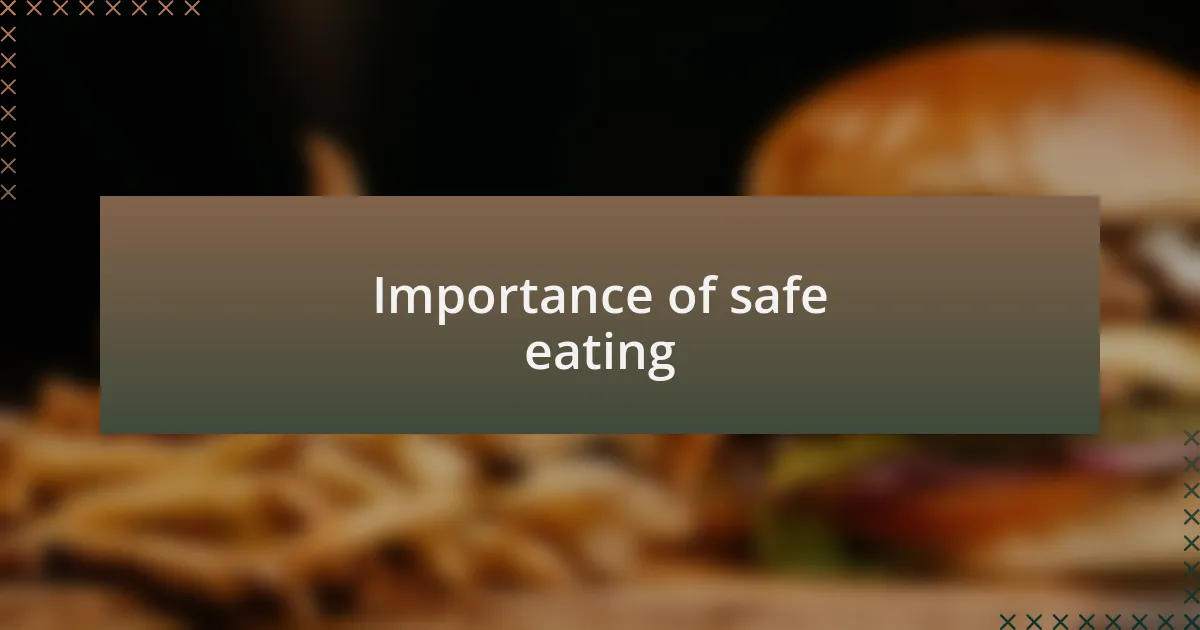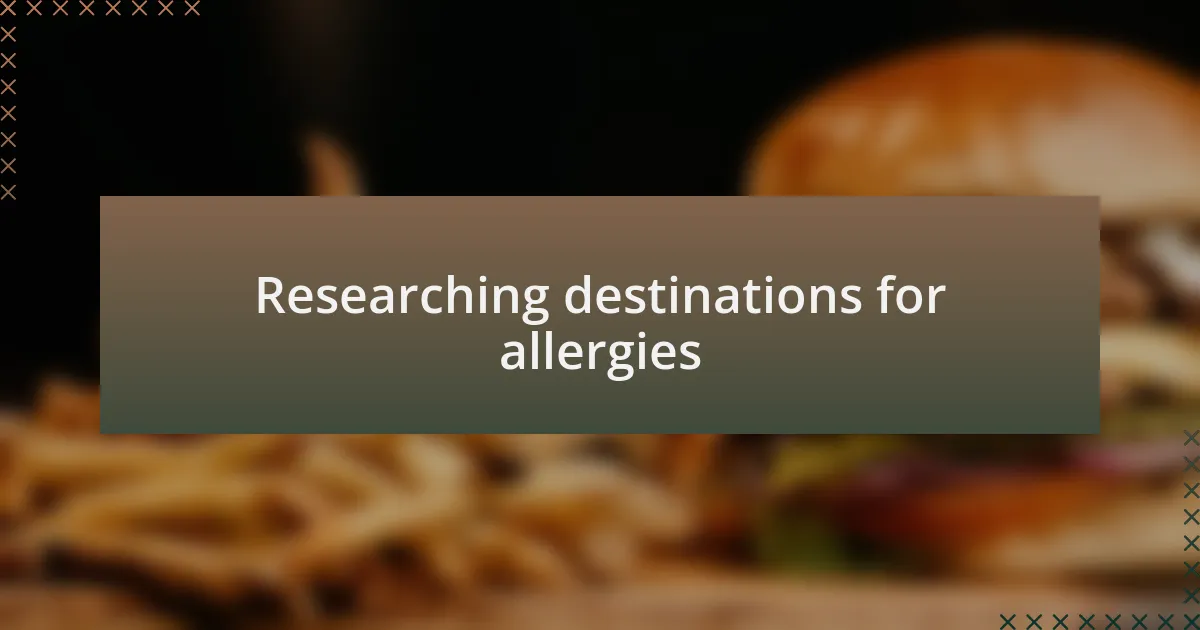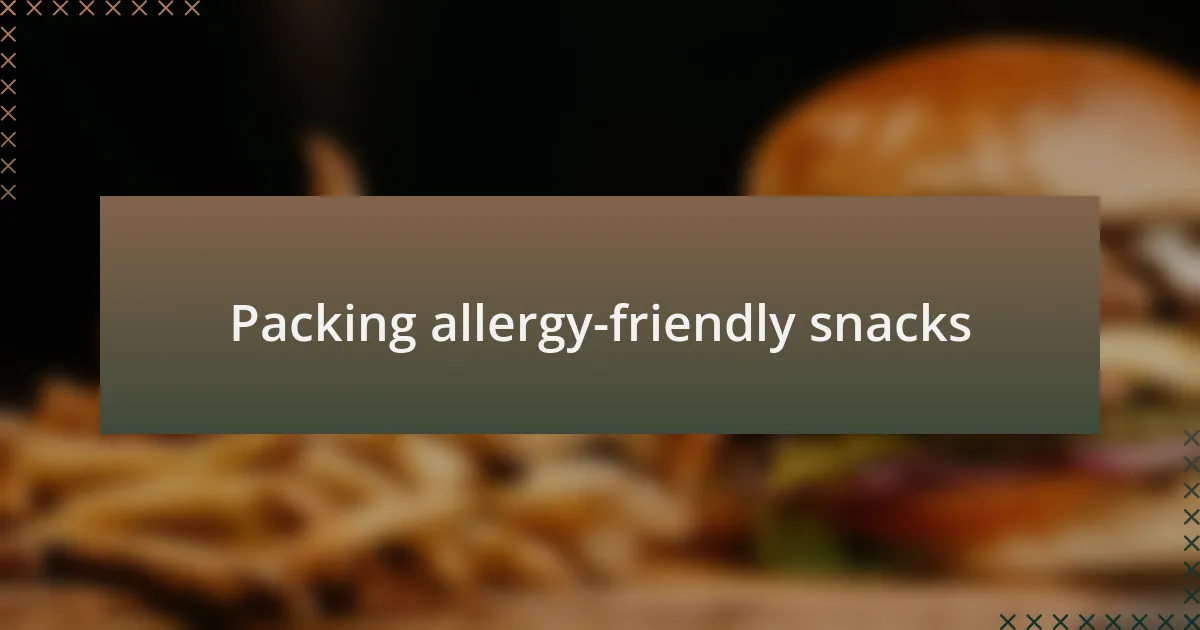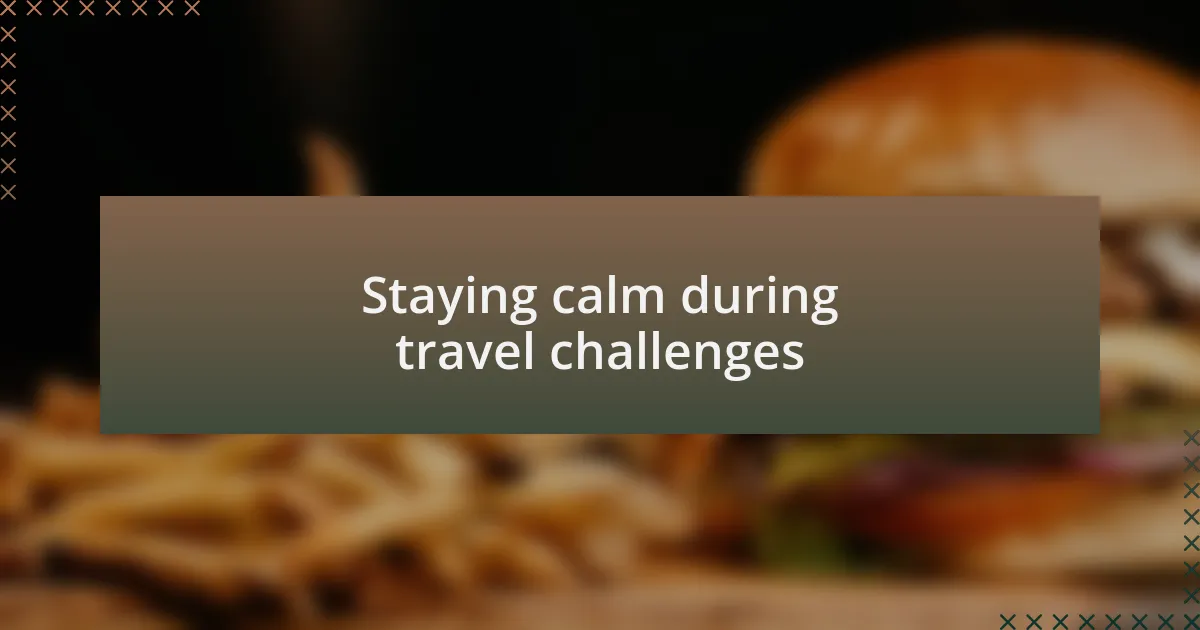Key takeaways:
- Understanding food allergies is crucial for personal safety and managing social interactions, highlighting the need for education among friends and family.
- Proactive meal planning and effective communication are essential strategies to ensure safe dining experiences while traveling.
- Researching destinations and local food cultures can lead to finding safe dining options and reducing anxiety during travels.
- Packing allergy-friendly snacks provides reassurance and comfort, allowing travelers to focus on their experiences without compromising health.

Understanding food allergies
Food allergies can often feel overwhelming, and I’ve learned that many people may not fully grasp their seriousness. Imagine biting into what you thought was a harmless cookie, only to discover it contained nuts. The sheer panic that ensues during an allergic reaction is something I would never wish upon anyone. Recognizing common allergens—like peanuts, tree nuts, dairy, and gluten—can be vital in avoiding such situations.
I recall a family dinner gone wrong when a well-meaning relative used a marinade containing soy sauce without realizing I was allergic to soy. The experience was not just physically unsettling; it was emotionally charged as I navigated my discomfort while trying to communicate my needs. This incident reminds us that food allergies can affect relationships and gatherings, making it crucial to educate friends and family about what we can safely enjoy.
Understanding the nuances of food allergies also means being aware that reactions can vary widely. Some may experience mild discomfort, while others could face life-threatening situations. This variability begs the question: How can we best prepare for dining out or traveling in such unpredictable circumstances? Through experience, I’ve found that proactive communication and awareness are key to navigating these challenges safely.

Importance of safe eating
Safe eating is not just about avoiding allergens; it’s about protecting one’s peace of mind. I remember a vacation where I meticulously researched restaurants with allergy-friendly options, but still found myself feeling anxious. Would the staff truly understand the importance of my dietary restrictions? This constant doubt underscores how essential it is for us to prioritize and advocate for safe eating practices whenever we’re on the go.
When traveling, the risk of accidental exposure to allergens can heighten stress levels. On one trip, I chose to pack my snacks to avoid the uncertainty of local cuisine. This simple act provided a layer of comfort, allowing me to focus more on enjoying the sights than worrying about what I’d eat. Safe eating means empowering ourselves to make choices that align with our health needs, bringing a sense of control into an otherwise unpredictable environment.
Ultimately, the importance of safe eating stretches beyond merely avoiding physical harm. It can influence our overall travel experience, shaping memories and emotions. Have you ever let fear of an allergen ruin a moment that should have been joyful? I certainly have, and it’s a reminder of why staying vigilant about safe eating is paramount—not just for our health but for our happiness, too.

Planning meals in advance
Planning meals in advance is an essential strategy for anyone with food allergies. I recall a time when I was heading to a family reunion in a town I had never visited. Instead of relying on potentially risky local options, I took the initiative to prepare several allergy-friendly dishes ahead of time. This made my dining experience enjoyable and worry-free, knowing I had trustworthy meals on hand.
It’s also beneficial to create a meal plan that accounts for each day of your trip. I often jot down my preferred meals and snacks, considering factors like travel schedule and available kitchen resources at my destination. This process not only helps me manage my allergies but also minimizes the stress of last-minute decisions. Have you ever arrived at a restaurant and felt your heart race while scanning the menu? By planning ahead, I can avoid that anxiety and have a delicious meal that I know is safe.
In addition, I recommend bringing a list of safe foods and meals you’ve successfully made at home. When I traveled to a country where English wasn’t widely spoken, having that list proved invaluable. I could communicate my needs more effectively, creating a connection with local chefs or hosts. It’s incredible how a little preparation can foster both safety and culinary adventure.

Researching destinations for allergies
When researching destinations for allergies, it’s crucial to dig deep into the local food culture. I remember planning a trip to Italy, where I was both excited and apprehensive about gluten. I spent hours researching which towns offered gluten-free options and stumbled upon a gluten-free bakery in Florence that became one of the highlights of my trip. Have you ever felt the thrill of discovering a safe haven for your dietary restrictions while traveling? It truly transforms your experience.
I also encourage travelers to check local forums or social media groups dedicated to food allergies. During my planning for a visit to Mexico, I found a Facebook group that provided invaluable advice about restaurants and street food vendors that catered to various allergies. Engaging with locals who share similar dietary challenges not only gives you specific recommendations but also a sense of community and support while abroad.
Remember to explore how accessible food is in your destination. On one trip to Japan, I was amazed by the clear labeling on food products in supermarkets. This attention to detail made me feel more at ease, knowing I could navigate options safely. It’s these kinds of insights, uncovered through diligent research, that allow you to enjoy the culinary delights of a new place without compromising your health.

Communicating dietary needs effectively
Effectively communicating dietary needs starts long before you reach your destination. I recall dining at a bustling restaurant in Barcelona where the language barrier made it challenging to convey my gluten allergy. I found that learning a few key phrases in the local language, such as “sin gluten” for “without gluten,” not only eased my worries but also created a rapport with the staff. Isn’t it empowering to see how a little preparation can lead to safer dining experiences?
When you arrive at a restaurant, it’s important to be clear yet polite about your dietary restrictions. I once approached a waiter with a specific question about a dish’s ingredients, and I noticed his face light up with appreciation for my directness. This openness led to a fruitful conversation about food preparation, ensuring my meal was safe. Have you ever felt the relief of knowing exactly what you’re eating thanks to transparent communication?
In addition to verbal communication, consider using dietary cards that list your allergies in the local language. On a trip to Thailand, I carried a card that accurately explained my nut allergy. Not only did it make ordering smoother, but it also sparked conversations with servers, many of whom expressed genuine concern for my health. How reassuring it is to know that clear communication can foster not just safety, but also understanding and connection!

Packing allergy-friendly snacks
Packing allergy-friendly snacks can be a game-changer when you’re on the go. I vividly remember a trip where I packed homemade energy bars that were free of all the allergens I have. Each bite was not just fuel; it reminded me of my kitchen back home. It felt comforting to know I had something safe to munch on during long travel days. Have you ever experienced the peace of mind that comes from a familiar snack?
One essential tip I have is to consider shelf-stable options like trail mix (carefully checked for allergens) or rice cakes. On a recent journey, I brought a mix of seeds and dried fruit that kept my energy levels high while satisfying my cravings. Sharing it with fellow travelers became an unexpected bonding moment—who knew a snack could serve as a conversation starter? Isn’t it wonderful how the right food can enhance your travel experience?
Don’t forget to pack snacks that require minimal prep, as convenience is key while traveling. I once relied on pre-packaged allergy-friendly snacks during a busy airport layover, and it felt great not to compromise my health for convenience. Convenience shouldn’t mean settling; it can still align with your dietary needs if you plan ahead. Have you thought about the convenience vs. safety balance when you travel?

Staying calm during travel challenges
Travel often brings unexpected challenges, especially when managing food allergies. I recall a moment when my flight was delayed, and the anxiety of finding safe food options washed over me. Instead of letting panic creep in, I took a deep breath and reminded myself that I had my own snacks handy. That sense of control shifted my focus from stress to gratitude—do you ever find yourself tapping into inner calm during travel hiccups?
Even when I encounter unfamiliar environments, I remind myself to stay patient and adaptable. One time, I was at a bustling airport cafe with limited allergy-friendly choices. Instead of feeling overwhelmed, I asked the staff about the ingredients and options. Engaging positively with them not only eased my worries but made the experience more enjoyable. How do you approach food challenges when dining out while traveling?
If plans go awry, my mantra is to stay flexible. I remember a time when my go-to restaurant informed me they could not accommodate my allergies. Instead of frustration, I celebrated the opportunity to seek out a new local spot. The charm of unexpected discoveries often outweighs the initial disappointment. Have you ever turned a travel setback into an adventure?